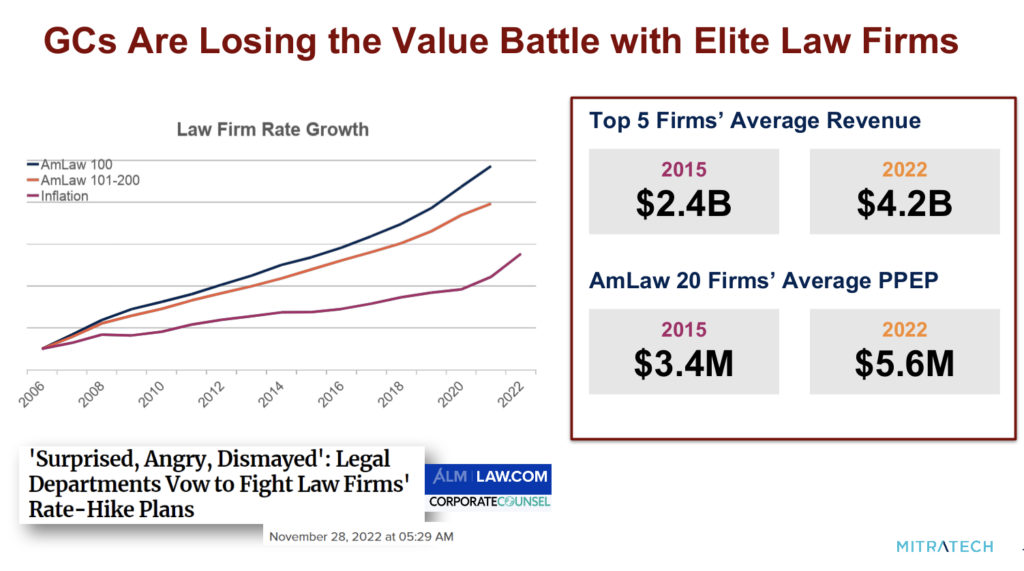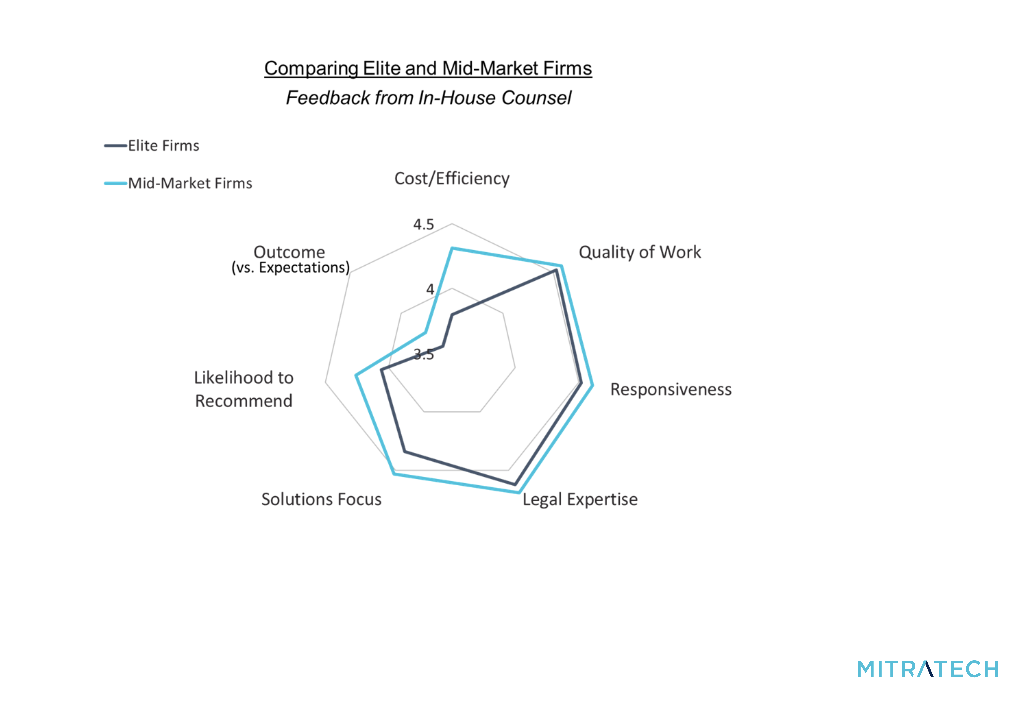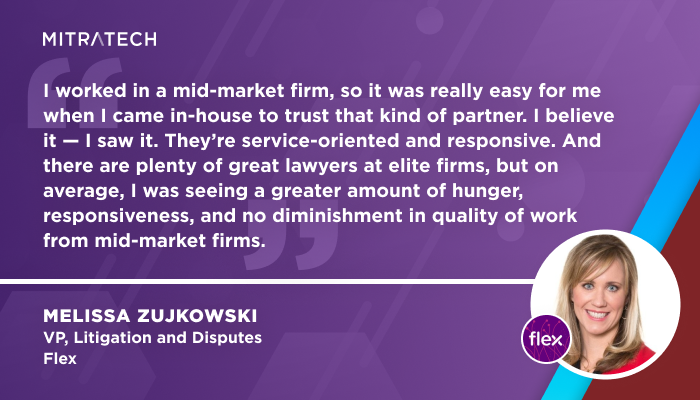Amid rising firm rates and falling leverage, see how in-house counsel are making the move to strategic partnerships with mid-sized partner firms to improve quality of work, drive savings, and build better relationships.
In a recent webinar, Transforming Outside Counsel Relationships for Cost Savings, Value, and Diversity, we learned that 7/10 legal teams are seeing rate increases above 5%, and 3/10 are seeing increases of 8% or more.
Also consider the following statistics:
- Only 42% of GCs report feeling very satisfied with their law firms
- 84% of GCs have become more selective about which law firms they use
- 78% of GCs likely looking to replace existing counsel in 2023
- 83% of GCs are becoming more focused on return from law firm engagement
Senior in-house leaders from Discover Financial, Flex, and Honeywell traded insights on how they have worked with AdvanceLaw to establish new relationships with a small circle of strategic partner law firms to avoid big annual rate increases, improve quality of work, reduce outside counsel fees, and strengthen diversity. Below, we’ve broken down what drove them to reevaluate their firm relationships, selection process, and best practices for achieving the desired panel results.
In case you missed the full conversation — or would like to revisit the insights with your team — you can access these on-demand replay at any time here.
First Things First: How Do You Know When it’s Time to Transform Your Outside Counsel Relationships?
Here are six telling signs that it may be time to reevaluate your partner firms:
- Tens or hundreds of sub-scale, siloed relationships
- Over-reliance on a small number of (often elite) firms
- No transparency into — or reward for — strong performance
- Few opportunities for firms to grow the relationship
- Firms have little incentive to invest in the client
- Firms lack strategic knowledge/client lack value adds
Our expert panelists experienced many of these challenges firsthand before reevaluating and transforming their relationships. At Discover, for example, teams were used to leaning on the same firms that they had been partnering with for years and hadn’t done much new outreach, making the in-house team feeling like they were leaving value on the table:
“We were really missing out on some of those value-added benefits that come when you have a panel in these relationships. Our main thing was wanting to streamline and centralize the process and have more ability to tap across the practice areas.” — April Thomas, Director of Legal Operations, Risk, and Business Strategy at Discover
Honeywell had similar goals:
“In looking for ways to improve performance and the overall value of our legal relationships, we started focusing on a smaller panel of go-to firms for specific needs of the business. That was the genesis of how we could corral our use of firms and manage performance, value of the legal relationship, and spend in a more organized fashion.” — Lynn Dummett, Chief Litigation Counsel at Honeywell
Making the Strategic Move From Elite to Mid-Market
While there is certainly a time and place to work with some of the largest firms in the world, there’s also a good reason to stop and consider working with sophisticated counsel at mid-market firms. In fact, according to AdvanceLaw’s Thought-Leader Experiment, on average, mid-market firms out-perform elite law firms on client feedback.

Survey result analysis on Law Firm Rate Growth, pulling from ALM Law.com

Survey result analysis on Law Firm Rate Growth, pulling from AdvanceLaw’s Thought Leader Experiment
In addition to performing as well or better than elite firms in the same key areas above, the strategic, mid-market approach allows for better relationship building. For many companies, it’s frustrating to work with large, global firms because they don’t have a lot of leverage to negotiate and are seeing rate increases.
“What we want to create is a win-win: companies feel valued, have cost-effective rates in place, and see incentives to send work to their preferred panel firms — and in turn, those firms understand what the company is trying to accomplish, the areas that are going to grow the relationship, and how they will be rewarded for excellent performance.” — Katherine Shell, VP, Advisory, AdvanceLaw
But even when it becomes clear that building a panel of highly-motivated, mid-size firms is the right move for your in-house counsel, how do you get started?
Finding the Right Firms: Start Here
While in-house lawyers often have pre-existing firm relationships, kickstarting the reevaluation and transformation process is less disruptive than it seems (with the right approach to change management, that is).
The key is to secure buy-in right from the start by involving your key stakeholders early and often.
“You have to create an environment where you’re building that buy-in; You’re letting them get exposed to these top-notch lawyers, supporting the business in the same way that the big firms do.” — Lynn Dummett, Chief Litigation Counsel at Honeywell
Once you’ve gathered a solid understanding of what your internal parties are looking to gain in your new panel relationships — across all practice areas relevant to you — it’s time to begin the RFI process.
Unfortunately, with thousands of pages to review and limited time to really dive in, few teams actually learn enough from the RFI process to make actionable changes. Surface-level questions lead to surface-level answers, and too often, teams end up defaulting to the same familiar firms while missing out on opportunities to find new firms hungry for their business.
By outsourcing the law firm selection process with AdvanceLaw, you can make sure you:
- Define your legal needs clearly and comprehensively
- Ask the best possible questions of firms to understand their capabilities
- Get an actionable digest of the hundreds of pages of firm RFI responses
- And ultimately, gain confidence in new firms, better value firms with top talent
In essence, AdvanceLaw keeps the RFI and evaluation process short, strategic, and sweet — and, in the process, creates a better relationship and understanding of internal needs. As Anne Madden, Senior Vice President and General Counsel at Honeywell, put it during an interview with Bloomberg Law:
“The AdvanceLaw team really did the hard work on the front end to pre-screen a panel of firms that were exactly where we needed the most outside counsel support. Then we rank them on important criteria to us, such as rates, diversity and innovation, geographic coverage, and expertise in key areas, and then rack and stack them…. The framework we used was so good. It did make it more scientific than just emotions and ad hoc likes and dislikes.” —Anne Madden, Senior Vice President and General Counsel at Honeywell

AdvanceLaw Panel Heat Map
AdvanceLaw uses these insights to not only help you build the panel, but also to identify the best-qualified, best-value (and most diverse) counsel within the panel after launch, ensuring the transition process is seamless and that you always have access to the right expertise. Beyond firm rates, regional coverage, subject matter areas, etc., here are a few questions that AdvanceLaw gathers data on when considering a firm for an incumbent spot or solving a new matter:
- Who would be the firm staff on this matter?
- What are 2-3 specific examples of how the proposed team supported other clients on similar matters? What outcome was achieved?
- In disputes, does the proposed team have connections with the court and/or opposing counsel?
- What is the firm’s proposed strategy for the matter?
- What is the firm’s fee estimate, and what assumptions underpin it?
- How many of the timekeepers are from historically underrepresented groups?
And the job isn’t done once the panel is established; the AdvanceLaw team also sticks around to help you manage it, assisting with relationship-building, analytics on firm performance, and migration of work.
The AdvanceLaw Advantage (And Real Results)
By building stronger relationships with a panel of providers where mid-size firms are more strongly represented, clients are finding a real win-win:

For Flex, partnering with a small, strategic panel of “Trusted Advisor” firms has built stronger relationships with firms and improved the quality of advice, helping the in-house team partner more effectively with clients:
“We call it our Trusted Advisor Panel; we are basically telling the group that we will be giving 80% or more of the work to them, and in exchange, we expect our panel firms to invest in getting to know us and our strategic priorities.” — Melissa Zujkowski, VP, Litigation and Disputes at Flex
Do you think the move to a more strategic panel relationship could be the right move for you? Download the full webinar replay for further insights on:
- How peers are leveraging AdvanceLaw to transform outside counsel relationships.
- How to to build feedback into the sourcing process
- How to field off-panel exceptions and drive work to your selected firms
- How to track your spend and where the new matters are going
- How to build relationships at scale & so much more
- Drive DEI projects across matter and sourcing


